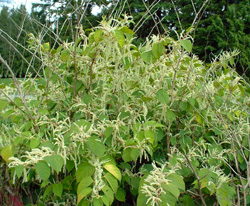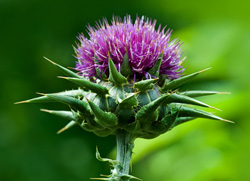What is an Invasive Species?
Invasive species are plants or animals that have been introduced from outside of their native range and have the potential to negatively impact humans, animals and/or ecosystems. Invasive species have the ability to establish quickly in new areas and spread rapidly. Poison Hemlock can be deadly to people and animals if ingested. Giant Hogweed has highly toxic sap that can cause blisters when it comes in contact with skin. Japanese Knotweed, Scotch Broom and Blessed Milk Thistle are just a few other invasive plants we need to manage in our region.
The Capital Region is working to eradicate knotweed before it takes hold. If you see knot weed, report it! Check out Knot on My Property for more information.
View a list of invasive plants of concern in the Capital Region on the Capital Region Invasive Species Partnership website.
What impact to invasive species have on Colwood?
- Threat to native ecosystems and wildlife habitats
- Loss of biodiversity, including endangered species
- Increased wildfire hazards and soil erosion
- Threats to human and animal health
- Increased maintenance costs for landowners
- Reduction or elimination of recreational values (land and water)
- Economic impacts such as to agriculture and infrastructure
What Can You Do?
- Not sure if it's invasive? Give public works at call at 250-474-4133
- Remove invasive plants on your property
- Dispose of invasive plants in appropriate locations - bagging and disposal at the landfill may be required
- Know what you can bring to Colwood Branch Drop Off: We CAN ACCEPT: Scotch Broom, English Ivy, English Holly, Himalayan Blackberry, English Hawthorn and Periwinkle.
- Garden with native species and help create valuable wildlife habitats
- Clean tools, equipment and footwear before leaving an area infested with invasive plants
- Share information about invasive plants with friends and neighbours
- Volunteer your time to help control invasive species in the region





